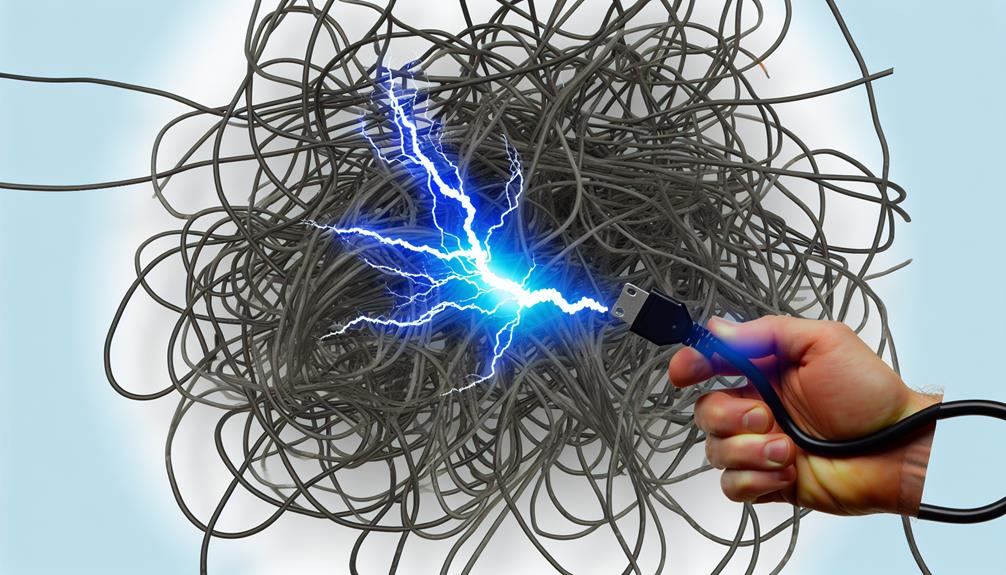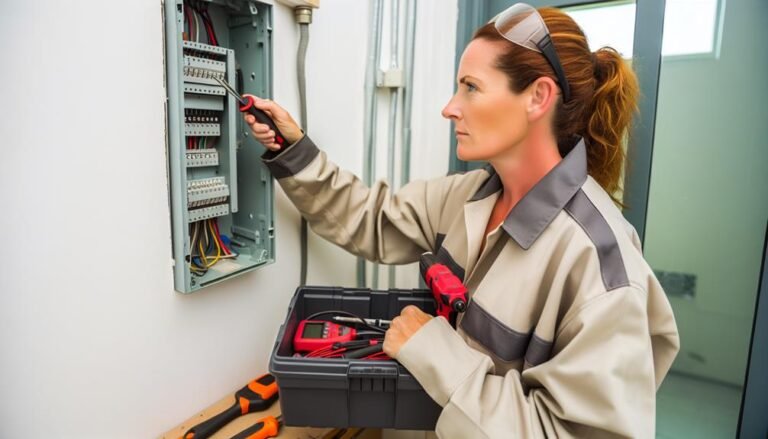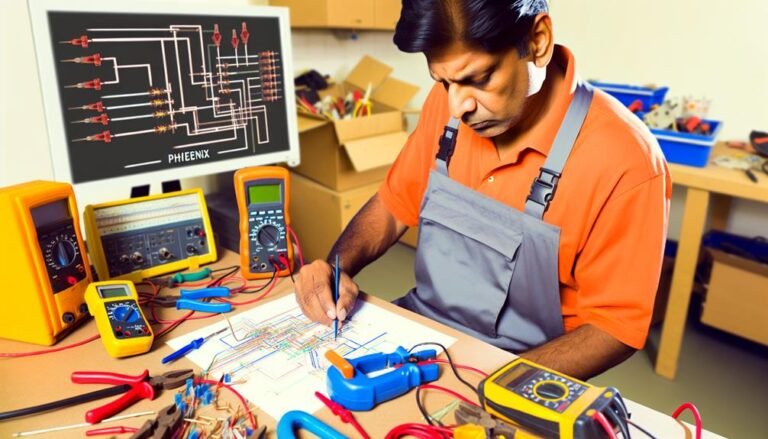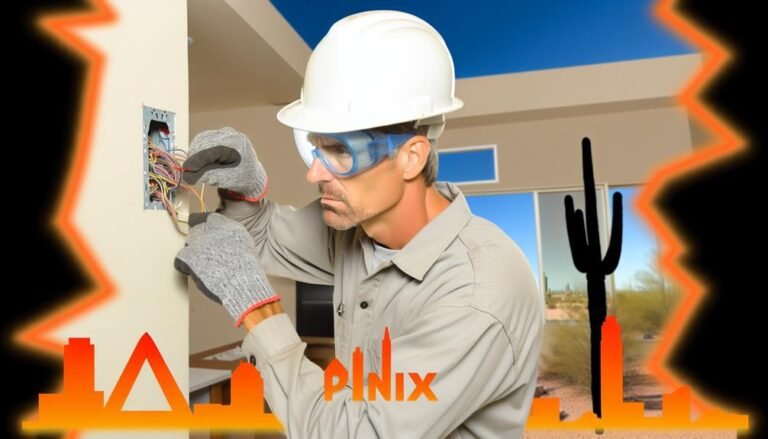Common Electrical Service Misconceptions Debunked
So, you think you know everything there is to know about electrical service? Well, think again. It’s time to shed some light on the common misconceptions that have been fooling even the most knowledgeable of individuals.
From the belief that higher voltage always equals higher danger to the idea that DIY fixes are the way to go, there are plenty of myths that need debunking.
But that’s not all. Stick around, because we’re about to reveal some surprising truths that might just make you reconsider everything you thought you knew about electrical service.
Key Takeaways
- Higher voltage does not always indicate higher danger in electrical service.
- DIY solutions for electrical issues can lead to more harm than good.
- Hiring professional electricians can save money in the long run by avoiding costly mistakes.
- Regular maintenance ensures the safety and efficiency of the electrical system.
Higher Voltage Does Not Always Mean Higher Danger
Higher voltage doesn’t necessarily indicate a higher level of danger in electrical service. It’s a common misconception that higher voltage automatically means higher risk, but this isn’t always the case. In fact, the level of danger in electrical service depends on several factors, including the quality of the electrical equipment, the condition of the wiring, and the presence of safety measures.
While it’s true that higher voltage can deliver more power and cause more severe injuries, it’s important to note that electrical systems are designed with safety in mind. Proper insulation, grounding, and circuit protection devices help mitigate the risks associated with higher voltage. In addition, safety precautions such as safety switches, circuit breakers, and surge protectors are implemented to ensure the safety of the electrical system and its users.
It is crucial to understand that the danger lies not solely in the voltage level, but in the potential for electrical shock, arc flash, or fire hazards. It’s essential to have a qualified electrician regularly inspect and maintain the electrical system to ensure its proper functioning and to identify any potential risks.
DIY Fixes Can Lead to More Harm Than Good
When attempting to fix electrical issues, it is important to note that DIY solutions can often result in more harm than good. While it may be tempting to save money and tackle electrical problems yourself, it is crucial to consider the potential risks involved. Electrical systems are complex and require specialized knowledge and skills to handle safely. Without proper training and experience, you could unintentionally cause further damage, endanger yourself and others, or even start a fire.
To emphasize the dangers of DIY electrical fixes, let’s consider a comparison between professional electricians and DIY enthusiasts in terms of their knowledge, expertise, and safety practices:
| Aspect | Professional Electricians | DIY Enthusiasts |
|---|---|---|
| Knowledge | Extensive understanding of electrical systems and codes | Limited knowledge acquired through online tutorials |
| Expertise | Trained and certified in electrical work | May lack experience and skills required for complex tasks |
| Safety | Adhere to strict safety protocols and use proper protective gear | May overlook safety precautions and use inadequate tools |
As you can see from the table, professional electricians possess the necessary knowledge, expertise, and safety practices to ensure a safe and effective electrical repair. Attempting DIY fixes without the same level of expertise can lead to disastrous consequences.
All Electrical Problems Should Be Left to Professionals
Leave all electrical problems to the professionals to ensure a safe and effective resolution. When it comes to electrical issues, it’s essential to prioritize your safety and the well-being of your property. Here’s why you should always rely on experts for electrical problem-solving:
- Training and Expertise
- Electricians go through extensive training and have the necessary expertise to handle various electrical problems.
- They’re equipped with the knowledge to identify the root cause of the issue and provide appropriate solutions.
- Safety First
- Dealing with electricity can be dangerous, especially if you lack the proper knowledge and experience.
- Professionals understand the safety protocols and take necessary precautions to minimize the risk of accidents or electrical hazards.
- Proper Tools and Equipment
- Electricians have specialized tools and equipment designed specifically for electrical work.
- Using the right tools ensures the job is done accurately, reducing the risk of further damage or complications.
- Long-Term Cost Savings
- While hiring a professional may seem expensive initially, it can save you money in the long run.
- Their expertise prevents costly mistakes and ensures the problem is resolved correctly, avoiding future issues.
Electrical Service Costs Are Not Always Expensive
Hiring a professional electrician for electrical services does not always mean incurring high costs. While some electrical projects may require significant investment, there are also instances where the expenses are quite reasonable. It is essential to understand the factors that influence electrical service costs to make informed decisions.
To help you gain a better understanding, let’s look at a table that outlines the average costs for common electrical services:
| Electrical Service | Average Cost (USD) | Factors Affecting Cost |
|---|---|---|
| Electrical Wiring | $1,500 – $10,000 | Size of the property, complexity of the installation |
| Panel Upgrade | $800 – $3,000 | Amp capacity, type of panel, extent of rewiring |
| Outlet Installation | $150 – $500 | Number of outlets, location, accessibility |
| Lighting Fixture | $100 – $1,000 | Type of fixture, installation complexity |
As you can see, the costs vary depending on the nature of the electrical service. Factors such as property size, installation complexity, and the extent of rewiring can influence the final price. It is recommended to obtain multiple quotes from reputable electricians and compare them to ensure you receive a fair price for the services required.
Regular Maintenance Is Crucial for Safety and Efficiency
Regular maintenance plays a crucial role in ensuring the safety and efficiency of your electrical system. By regularly maintaining your electrical system, you can prevent potential hazards and ensure that your system operates at optimal levels. Here are some key reasons why regular maintenance is essential:
Safety:
- Regular maintenance helps identify and address potential safety issues such as faulty wiring, loose connections, or outdated equipment. This prevents electrical hazards like electrical shocks or fires, ensuring the safety of you and your loved ones.
- Maintenance also includes inspecting and testing safety devices such as circuit breakers and ground fault circuit interrupters (GFCIs). These devices are designed to protect you from electrical accidents, and regular maintenance ensures they’re functioning properly.
Efficiency:
- Over time, electrical systems can become inefficient due to factors like dust buildup, worn-out components, or outdated technology. Regular maintenance helps identify and rectify these issues, optimizing the performance and efficiency of your electrical system.
- By keeping your electrical system in top condition, you can avoid energy wastage, reduce utility bills, and contribute to a greener environment.
© 2026 By Electrician Phoenix Today







